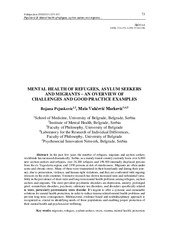Prikaz osnovnih podataka o dokumentu
Mentalno zdravlje izbeglica, tražilaca azila i migranta - izazovi i primeri dobre prakse
Mental health of refugees, asylum seekers and migrants: An overview of challenges and good practice examples
| dc.creator | Pejušković, Bojana | |
| dc.creator | Vukčević Marković, Maša | |
| dc.date.accessioned | 2021-10-12T13:14:53Z | |
| dc.date.available | 2021-10-12T13:14:53Z | |
| dc.date.issued | 2020 | |
| dc.identifier.issn | 0350-2538 | |
| dc.identifier.uri | http://reff.f.bg.ac.rs/handle/123456789/3052 | |
| dc.description.abstract | U poslednjih nekoliko godina, broj izbeglica, migranata i tražilaca azila dramatično je porastao širom sveta. Srbija, kao glavna tranzitna zemlja, trenutno je domaćin za preko 6,000 novih tražilaca azila i izbeglica, za preko 26,200 izbeglica i 198,500 interno raseljenih lica iz regiona bivše Jugoslavije, kao i za 1,950 osoba pod rizikom od gubitka države. Migranti su često pod akutnim i hroničnim stresom. Mnogi od njih traumatizovani su u svojim domovinama i tokom puta, usled progona, nasilja, povreda ljudskim prava, i suočeni su sa stalnim stresorima u zemljama egzila. Obimna istraživanja pokazala su povećane stope i znatnu varijabilnost u prevalenciji kratkoročnih i dugoročnih problema mentalnog zdravlja među izbeglicama, tražiocima azila i migrantima. Najprevalentniji psihijatrijski poremećaji su depresija, anksioznost, prolongirano tugovanje, somatoformni poremećaji, psihoze, zloupotreba supstanci, kao i poremećaji specifično povezani sa stresom, posebno posttraumatski stresni poremećaj. Hitno je potrebno ponuditi sistematične i održive solucije za zaštitu mentalnog zdravlja, kako bi se smanjili sa traumom povezani problemi mentalnog zdravlja i prevenirale dogoročne posledice. Multisektorni, na dokazima zasnovan, multidisciplinarni pristup, prepoznat je kao krucijalni u prepoznavanju potreba ovih populacija i omogućavanju adekvatne zaštite njihovog mentalnog zdravlja i psihosocijalnog blagostanja. | sr |
| dc.description.abstract | In the past few years the number of refugees, migrants and asylum seekers worldwide has increased dramatically. Serbia, as a mainly transit country currently hosts over 6,000 new asylum-seekers and refugees, over 26.200 refugees and 198.500 internally displaced persons from the ex-Yugoslavia region, and 1.950 persons at risk of statelessness. Migrants are often under acute and chronic stress. Many of them were traumatized in their homelands and during their journey , due to persecution, violence, and human right violations, and they are confronted with ongoing stressors in the exile countries. Extensive research has shown increased rates and substantial variability in the prevalence of short-term and long-term mental health problems among refugees, asylum seekers and migrants. The most prevalent psychiatric disorders are depression, anxiety, prolonged grief, somatoform disorders, psychosis, substance use disorders, and disorders specifically related to stress, particularly posttraumatic stress disorder. It's urgent to offer a systemic and sustainable solutions for mental health protection, in order to reduce trauma related mental health problems and prevent long-term consequences. Multisectoral, evidence-based and multidisciplinary approach is recognized as crucial in identifying needs of these populations and enabling proper protection of their mental health and psychosocial wellbeing. | en |
| dc.publisher | Institut za mentalno zdravlje, Beograd | |
| dc.rights | openAccess | |
| dc.rights.uri | https://creativecommons.org/licenses/by-nc/4.0/ | |
| dc.source | Psihijatrija danas | |
| dc.subject | zaštita | sr |
| dc.subject | tražioci azila | sr |
| dc.subject | trauma | sr |
| dc.subject | stres | sr |
| dc.subject | migranti | sr |
| dc.subject | mentalno zdravlje | sr |
| dc.subject | izbeglice | sr |
| dc.subject | trauma | en |
| dc.subject | stress | en |
| dc.subject | refugees | en |
| dc.subject | protection | en |
| dc.subject | migrants | en |
| dc.subject | mental health | en |
| dc.subject | asylum seekers | en |
| dc.title | Mentalno zdravlje izbeglica, tražilaca azila i migranta - izazovi i primeri dobre prakse | sr |
| dc.title | Mental health of refugees, asylum seekers and migrants: An overview of challenges and good practice examples | en |
| dc.type | article | |
| dc.rights.license | BY-NC | |
| dc.citation.epage | 87 | |
| dc.citation.issue | 1-2 | |
| dc.citation.other | 52(1-2): 73-87 | |
| dc.citation.spage | 73 | |
| dc.citation.volume | 52 | |
| dc.identifier.doi | 10.5937/PsihDan2001073P | |
| dc.identifier.fulltext | http://reff.f.bg.ac.rs/bitstream/id/1680/3049.pdf | |
| dc.type.version | publishedVersion |

